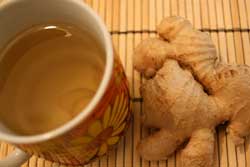Hot Drinks for Colds
December 10, 2008 Written by JP [Font too small?]Sometimes the best remedies are the simplest remedies. Today’s topic is certainly an illustration of just that.
There’s a special center at Cardiff University that focuses on all things related to the common cold. Earlier today, The Common Cold Centre released a statement touting the benefits of drinking hot drinks. Hot drinks? Yes, hot drinks!
They based their statement on a brand new study published in the clinical journal Rhinology (a journal dedicated to the study of the nose). In the study, they compared the effects of a fruit drink served either hot or at room temperature.
 The researchers reported that 30 cold sufferers found sustained relief of common cold symptoms like cough, chills, runny nose, sneezing, sore throat and fatigue simply by drinking the hot version of the beverage.
The researchers reported that 30 cold sufferers found sustained relief of common cold symptoms like cough, chills, runny nose, sneezing, sore throat and fatigue simply by drinking the hot version of the beverage.
Professor Ron Eccles, the director of the Cold Centre, provided the following analysis: “It is surprising that this is the first scientific research on the benefit of a hot drink for treating cold and flu symptoms.” He went on to add, “The big advantage of this type of treatment is that it is cheap as well as safe and effective.”
What could be simpler than having a hot beverage when you’re battling a cold or flu? But, I’d like to add a little something to Professor Eccles’ advice . If you’re going to drink something hot, why not choose something that also helps to combat the viruses that are at the root of these illnesses?
Drink an Anti-Viral Tea
Ginger tea has been scientifically shown to possess anti-inflammatory, immune boosting and natural anti-viral activity. All of these actions can help soothe a cold or flu and speed their departure.
Whenever I get sick, be it with a cold, the flu or an intestinal bug, I brew up a cup of strong ginger tea. I think it tastes great and it really seems to speed up my healing process.
Be well!
JP
Referenced Materials:
Link – Cardiff University Hot Drink Study Release
Link – Ginger vs. the Cold Virus
Tags: Cold, Ginger, Tea
Posted in Food and Drink

December 10th, 2008 at 11:47 pm
Ginger tea is very popular in China, it’s quite effective to cure old or flu, and completely natural – maybe that’s why so many people like it. Ginger is amazing, I know its usage for several common health problems such as Dysmenorrhea and hair loss caused by stress. Some people may lose hair overnight under great pressure or stress, as big as a coin.
December 10th, 2008 at 11:57 pm
That’s interesting, Kevin.
I know that ginger is often used in “adaptogenic” herbal blends. These are combinations of herbs that help you adapt to stress.
One form of hair loss, known as Alopecia areata (“spot baldness”), is thought to be an autoimmune disorder. And as I mentioned in today’s blog, ginger can play a role in the regulation of the immune system.
One day I hope ginger tea is as popular here as it is in China!
Be well!
JP
December 11th, 2008 at 12:22 am
Thanks JP, I don’t know the word for this kind of hair loss. ‘spot baldness’ is very accurate to describe it :-). My girlfriend had this problem, we used Ginger, it can speed the recovery.
April 21st, 2015 at 12:44 pm
Update 04/21/15:
http://www.biomedcentral.com/1471-2296/16/24
BMC Fam Pract. 2015 Feb 25;16(1):24.
The effectiveness of high dose zinc acetate lozenges on various common cold symptoms: a meta-analysis.
BACKGROUND: A previous meta-analysis found that high dose zinc acetate lozenges reduced the duration of common colds by 42%, whereas low zinc doses had no effect. Lozenges are dissolved in the pharyngeal region, thus there might be some difference in the effect of zinc lozenges on the duration of respiratory symptoms in the pharyngeal region compared with the nasal region. The objective of this study was to determine whether zinc acetate lozenges have different effects on the duration of common cold symptoms originating from different anatomical regions.
METHODS: We analyzed three randomized trials on zinc acetate lozenges for the common cold administering zinc in doses of 80-92 mg/day. All three trials reported the effect of zinc on seven respiratory symptoms, and three systemic symptoms. We pooled the effects of zinc lozenges for each symptom and calculated point estimates and 95% confidence intervals (95% CI).
RESULTS: Zinc acetate lozenges shortened the duration of nasal discharge by 34% (95% CI: 17% to 51%), nasal congestion by 37% (15% to 58%), sneezing by 22% (-1% to 45%), scratchy throat by 33% (8% to 59%), sore throat by 18% (-10% to 46%), hoarseness by 43% (3% to 83%), and cough by 46% (28% to 64%). Zinc lozenges shortened the duration of muscle ache by 54% (18% to 89%), but there was no difference in the duration of headache and fever.
CONCLUSIONS: The effect of zinc acetate lozenges on cold symptoms may be associated with the local availability of zinc from the lozenges, with the levels being highest in the pharyngeal region. However our findings indicate that the effects of zinc ions are not limited to the pharyngeal region. There is no indication that the effect of zinc lozenges on nasal symptoms is less than the effect on the symptoms of the pharyngeal region, which is more exposed to released zinc ions. Given that the adverse effects of zinc in the three trials were minor, zinc acetate lozenges releasing zinc ions at doses of about 80 mg/day may be a useful treatment for the common cold, started within 24 hours, for a time period of less than two weeks.
Be well!
JP